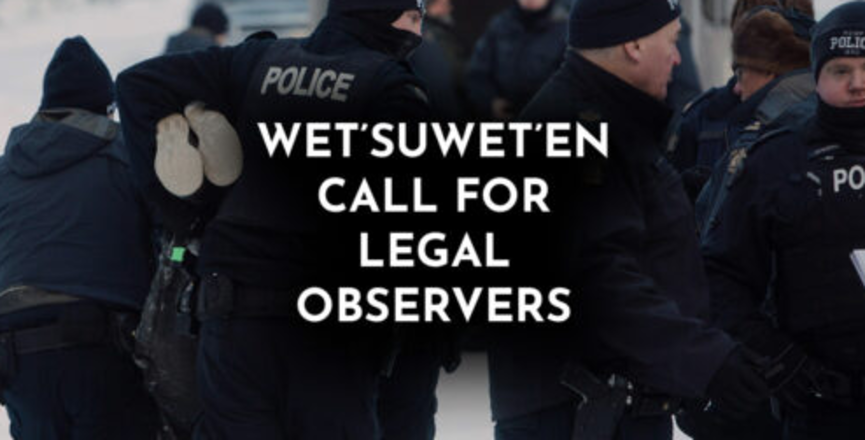Wet’suwet’en hereditary chiefs have not given their free, prior and informed consent to the construction of the Coastal GasLink fracked gas pipeline on their unceded territory in northern British Columbia.
On January 18, the Unisto’t’en camp posted: “Gidimt’en and Unist’ot’en are seeking legal observers. Our unceded Wet’suwet’en lands are under attack, with police enforcement of a colonial court injunction possible at any time.”
That post adds: “Hereditary chiefs of all five Wet’suwet’en clans have rejected the injunction decision [of December 31, 2019], which criminalizes Anuk ‘nu’at’en (Wet’suwet’en law), and have made clear that no access to Wet’suwet’en territories will be granted without free, prior and informed consent.”
“A legal observer witnesses and monitors the actions of law enforcement agencies and security forces and collects information for the purposes of legal defence. Legal observers: do not participate in protest or risk arrest; do not provide legal advice; do not speak to media; do not interfere with police activity; and remain ‘neutral’ while observing.”
The post also notes that Gidimt’en and Unist’ot’en “require a team of 50-60 legal observers.” The link to apply to be a legal observer is here.
Update on legal observers accessing the territory
On January 23, the Unist’ot’en camp tweeted: “RCMP are arbitrarily blocking lawyers out of #unistoten territory. A lawyer with @WaterProtectUs, helping train legal observers to document human rights abuses by RCMP, was targeted by police and told they won’t be allowed back on our unceded territory.”
Recounting that same incident, the Water Protector Legal Collective (WPLC) tweeted: “RCMP Deny Wet’suwet’en Access to Legal Observers.”
The WPLC also commented: “Canadian police banned WPLC ED @Carltonwilliams from Wet’suwet’en land to stop training and presence of #humanrights legal observers. This violates Wet’suwet’en #sovereignty.”
And Ricochet tweeted: “Raw video from @GitxsanJt of RCMP at the checkpoint explaining new policy to two lawyers [from the Water Protector Legal Collective] visiting clients at #Unistoten camp the other day. They’ll only let in lawyers who can practice in B.C., and require chains and forest service radios.”
Then on January 24, Irina Ceric tweeted: “I and another lawyer, @noahrossj were turned away from the RCMP checkpoint on #Wetsuweten territory today. The pretext was that we lacked chains and a two-way radio, a ‘policy’ that has been unevenly and arbitrarily applied.” As noted on his website, Ross practices law in British Columbia.
The Unist’ot’en camp additionally commented: “This is a radio-assisted road & radios are not legally required. The road is plowed & there’s no need for chains. These made up rules are a clear abusive of power by RCMP.”
Update on efforts to seek a peaceful resolution
On January 10, Chief Nam’oks, a spokesperson for the hereditary chiefs, asked in a letter to British Columbia Premier John Horgan and Canadian Prime Minister Justin Trudeau: “We formally request a meeting with you to discuss the impacts of the recent interlocutory injunction and RCMP enforcement.”
On January 20, CBC quoted Premier Horgan, a supporter of the pipeline, stating, “I’m not going to drop everything I’m doing to come running when someone is saying they need to speak with me. I’m not being disrespectful, I’m just saying be realistic here.”
There does not appear to have been a public response yet from Prime Minister Trudeau.
Subsequently, First Peoples Law highlighted, “Dozens of academics and lawyers from across Canada have signed the following letter urging the provincial and federal governments to meet directly with the Wet’suwet’en hereditary chiefs to open a nation-to-nation dialogue in the hopes of peacefully resolving the matter.”
That letter, dated January 22, notes: “Reconciliation and justice cannot be achieved by relying on the RCMP or resource companies to do the Crown’s work. We urge B.C. and Canada to meet with the Wet’suwet’en hereditary chiefs and to commit to a process for the peaceful and honourable resolution of this issue.”
On January 19-20, Nanaimo-Ladysmith MP Paul Manly met with Wet’suwet’en hereditary chiefs and the RCMP to talk about the ongoing situation. He commented: “The fact that the RCMP have been sent in shows that this is a political failure on the part of the provincial and federal governments.”
Canadian police on Wet’suwet’en territory
In December 2019, the United Nations Committee on the Elimination of Racial Discrimination (CERD) also called — in a motion — for Canada to guarantee no force will be used against the Wet’suwet’en peoples and asked that the RCMP and associated security and policing services be withdrawn from their traditional lands.
Then on January 10, British Columbia’s human rights commissioner Kasari Govender issued a statement agreeing with the UN committee and calling on Canada “to prohibit the use of lethal weapons, and to guarantee no force will be used against [the Wet’suwet’en]. This is a matter of fundamental human rights.”
The Wet’suwet’en hereditary chiefs also noted that they have “submitted a formal request to the United Nations to monitor RCMP, government and Coastal GasLink actions on our traditional, unceded territory.”
As of January 25, the RCMP are maintaining a checkpoint and exclusion zone at the 27-kilometre point on the Morice Forest service road on Wet’suwet’en territory.
For updates on the situation, please see the Twitter feed for the Unist’ot’en camp and the Gidimt’en checkpoint.
Brent Patterson is the executive director of Peace Brigades International-Canada. This article was originally published on the PBI-Canada website.



